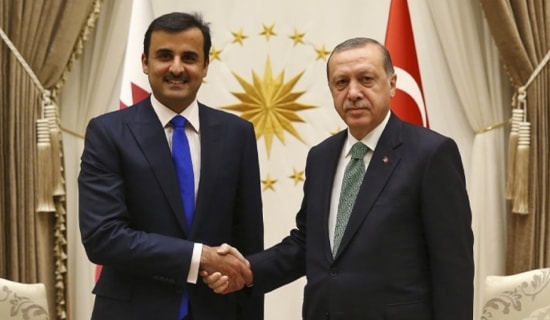Lebanese political commentator Dr. Sobhi Ghandour, who has resided in Washington, D.C. since 1987 and is editor of the Washington-based Arabic- and English-language magazine Al-Hewar, addressed the Arab countries in an op-ed titled "Who Is the Enemy Now?" in the UAE daily Al-Bayan. In it, he called on them to set aside their differences, formulate a joint strategy, and define the Arab ummah's main common enemy, in order to achieve the same unity that it had enjoyed in the 1967 and 1973 wars against Israel. Ghandour attributed the blurring of the Arab ummah's identity to the 1978 Camp David Accords, the ramifications of Iran's Islamic Revolution, and the fall of the Soviet Union. He argued that the rest of the world also experienced a similar confusion after the end of the Cold War, but that the West has since then defined its new enemy as "Islamic terrorism," whereas the Arabs are still divided over who their main enemy is - Israel, Iran, or terrorist organizations.

Dr. Sobhi Ghandour. Source: Alriyadh.com
The following are excerpts from his article:[1]
"The question 'who is the enemy now?' is always an important one for any ummah or country. The answer to this question sets the priorities for action, distinguishes friends from rivals or enemies, and also sets the norms for dealing with events and the modes of operation required for the strategy of dealing with 'the primary enemy'...
"The main problem of the Arab ummah lies not just in the Arab inability to agree on the question of 'who is the enemy now?' but primarily in the absence of Arab solidarity, which expresses [the position] of the entire Arab ummah. It is true that the Arabs constitute a single ummah - but this ummah is based on multiple countries that share neither outlooks nor any measure of effective coordination that will unite them at this time. On the contrary - some of them are [even] fighting each other.
"The proliferation of Arab governments and states does not constitute any obstacle to building a joint Arab strategy. The problem lies in the lack of political will for coordination and solidarity [among Arab countries], as well as in the fact that Egypt's role in the Arab world ended with [its] signing of a peace accord with Israel... The formulation of a joint strategy for a number of governments requires a leadership that spearheads joint activity among the many governments. This happened in the last century, when in World War II the U.S. headed a global alliance against 'a common enemy' - the alliance of Japan, Nazi Germany, and Fascist Italy. This Washington-led alliance was based not on ideological considerations or on harmony in the nature of its various regimes, but solely on the joint interest of facing a common enemy and putting differences aside for dealing with later. Indeed, the Allies won WWII due to the pact between Communist Russia and Capitalist America aimed at liberating Europe from Nazism and Fascism.
"The Arab ummah also had a similar experience after the 1967 war, when Nasser's Egypt called for an emergency Arab League Summit in Khartoum. At that summit, it was decided to formulate a joint Arab strategy to remove the Israeli aggression[2] and to end all secondary Arab struggles - including the war that was ongoing in Yemen at that time, in which the Egyptian army was involved and which caused many disagreements between Egypt and Saudi Arabia. As a result of the Khartoum summit, the Arab 'oil and weapons' alliance was formed; under it, most of the Arab oil nations provided substantial financial aid to Egypt and Syria for them to rebuild their armies in preparation for the 1973 war. Additionally, for the first time, oil was used as a weapon to apply economic pressure, and exports to countries that supported Israel ceased.
"It appears, therefore, that the Arab situation in the previous century was much more clear than in the present one. The enemy of the Arabs in the first half of the 20th century was European imperialism, which occupied some countries in the region and extended its authority to the others. Back then, it was no problem to define the enemy. The third quarter of the 20th century was also characterized by clarity regarding the identity of the Arabs' 'common enemy' - 'the Zionist enemy' and its supporters.
"The Arab ambiguity with regard to defining 'the enemy' began in the last quarter of the 20th century, following the signing of the Camp David Accords and Egypt's withdrawal from the Arab conflict with Israel. [This ambiguity continued] after Iran's Revolution and its ramifications for its neighboring Arab countries and for the Palestinian issue, and after the fall of the Soviet Union and the end of the Cold War, which impacted all the Arab issues.
"[In fact], the entire world entered the new century with no clear understanding of the nature of 'the enemy,' because at that time many [old] perceptions were shattered - [for example,] Communism is no longer the enemy of the Capitalist West... Therefore, ideas about the West's 'new enemy' were circulated; that enemy comprises the extremist organizations operating in the name of Islam. The Zionist groups even labored around the globe to create a connection between terrorism and the organizations resisting Israel, in order to portray the entire Islamic world as 'the new enemy' of the West.
"In light of all of the above, September 11, 2001 is considered an important date in defining 'the new enemy,' which the West found in what it termed 'Islamic terrorism.' But the East is still pondering [the question of] the identity of its current enemy.
"The Arabs today are lacking in many things, but the most prominent of these is knowing who [their] 'main enemy' is. Moreover, what they primarily lack is an Arab consensus regarding a joint strategy with criteria for defining 'enemies' and 'friends.' Some Arabs argue that the enemy today is terrorist organizations, while others still see Israel as the 'main enemy', and some Arab elements have come out in recent years to call Iran 'the enemy'...
"The Arab region faces important changes during this year. These changes are connected to the three elements that are in dispute among the Arabs - that is, how to categorize Israel, Iran, and the extremist and terrorist organizations. We find that even the U.S. is currently troubled in [formulating] its future position on these three elements."
Endnotes:




